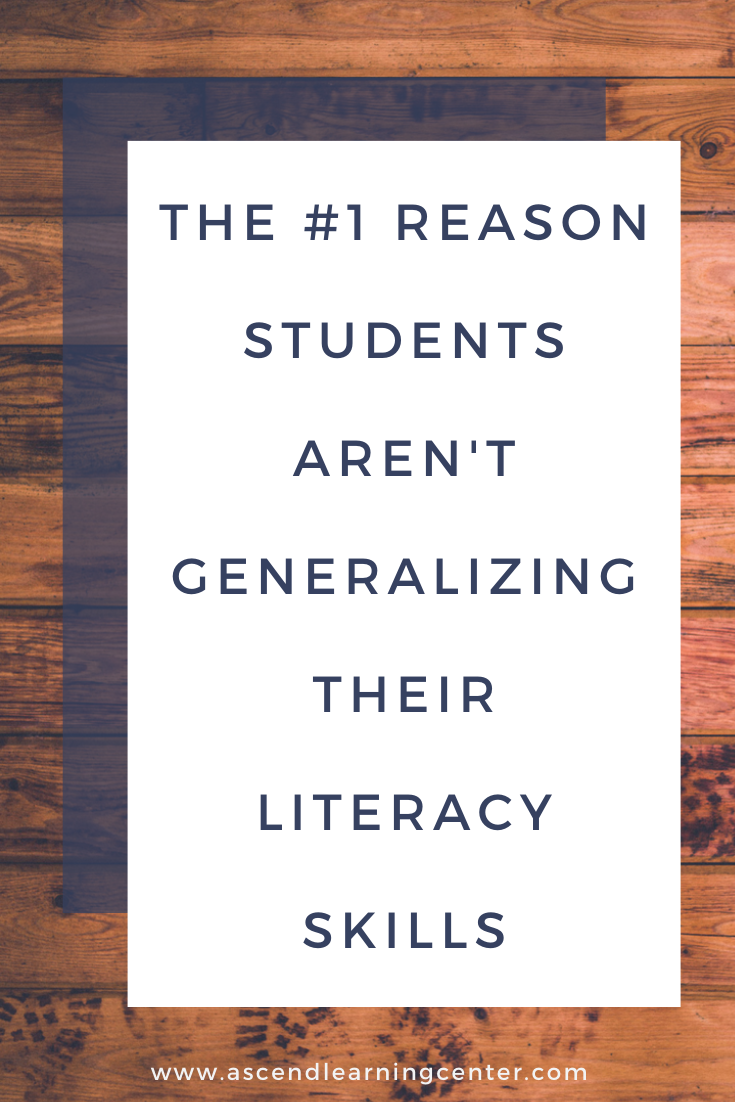The #1 Reason Students Aren't Generalizing Their Literacy Skills
Hey There!
We’ve been deep into sorting out student plans and connecting with general education teachers as we shift back into the school year. And one the of things that we’re always discussing on our team, with our students and their families, and with our students’ teachers is how to make sure that they are generalizing the content they are learning in their structured literacy lessons.
One of the biggest problems we’ve seen over the years is that many students receive solid, research-based intervention - they learn the skills but then are unable to take those skills (learned in the context of a structured and systematic approach) and apply them to what they need to be doing in the classroom. They are unable to apply it to their classroom reading and writing assignments.
And what we began to realize was that students were not receiving explicit instruction on how to take their knowledge of syllable division, phonogram patterns, phonological awareness, vocabulary development, and syntax discussion out of the context of their intervention sessions.
So the #1 reason students aren’t generalizing their intervention skills is that…
…we’re not explicitly teaching them how to apply their skills to their classwork.
We need to make sure that as we are working with students we begin helping them to create a bridge from structured and systematic instruction into the classroom. Often our students have the skills but they don’t know how to apply them. They understand the theory, they understand the structure of the language, and then don’t bridge into outside contexts.
What do we do?
We recognize that after students finish a structured/systematic or Orton-Gillingham-based intervention program they aren’t done with intervention.
We begin taking content from the classroom to help students apply their strategies of syllable division, sentence syntax, and vocabulary knowledge, we have them apply their editing strategies and checklists, apply their use of graphic organizers to the work they’re receiving that doesn’t occur in such a structured framework.
The biggest benefit to structured literacy is providing students with the skills they can use - but it’s not enough alone.
Once we’ve given students the knowledge and the background they need, they recognize HOW they learn and that structure does exist. When we can continue to provide that structure at a higher level - that’s where even bigger transformations can occur.
We always recommend creating a gradual transition in your intervention once you’re beginning to wrap up structured literacy instruction at any level. Once students have the skills to be able to decode and comprehend at a basic level we need to make sure they’re beginning to analyze their knowledge, draw important conclusions and inferences, and ask appropriate questions.
One of the things we love doing is transitioning students into literature and giving them the opportunity to apply their skills to authentic literature and books. Another option we love is pulling in assignments from the classroom to apply their skills and teaching them strategies such as using Cornell notes >>>grab our template here<<< or the graphic organizers we’ve taught them to organize their thinking and their knowledge at a higher level.
The great part about this is that we can support our students in beginning to “scoop” the words they may continue to struggle with, when they’re taking notes we can ask them to “tap out” words that continue to be more difficult to spell. And when we do this and create this space for the “bridge” between skills - they actually hold onto the skills they learned in their intervention time long-term.
Hopefully, this helps! Let us know in the comments how you help your students generalize their intervention skills! Then, jump into the 5CCL Activity Library, where you’ll find hundreds of activities that you can use in your instruction. The resources provide targeted practice for all 5 core components of literacy + writing!

